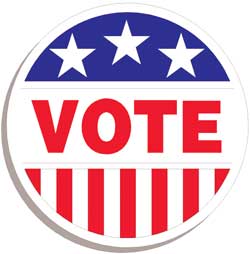
Blogging Domains For Sale
Bidding opens at: $100
Doughmain: http://www.VoteYesBlog.com
Bidding will ensue in auction-fashion and will remain open until buyer & seller agree on a final price. Should you wish to make a "Buy Now" bid, please indicate in your email that your price is final.
Please email all bids/inquires to: blogdomains@gmail.com
Voting is a method of decision making wherein a group such as a meeting or an electorate attempts to gauge its opinion—usually as a final step following discussions or debates. Alternatives to voting include consensus decision making (which works to avoid polarization and the marginalization of dissent) and betting (as in an anticipatory democracy).
In a democracy, voting commonly implies election, i.e. a way for an electorate to select among candidates for office. In politics voting is the method by which the electorate of a democracy appoints representatives in its government.
A vote, or a ballot, is an individual's act of voting, by which he or she express support or preference for a certain motion (e.g. a proposed resolution), a certain candidate, or a certain selection of candidates. A secret ballot, the standard way to protect voters' political privacy, generally takes place at a polling station. (Compare postal ballot). The act of voting in most countries is voluntary, however some countries, such as Australia, Belgium and Brazil, have compulsory voting systems.
Nevertheless, a country's having an election featuring the populace casting votes does not necessarily mean the country is democratic. Many authoritarian governments have "elections" but the candidates are pre-chosen and approved by elites, there is no competition, voter qualifications are restrictive, and voting is often a sham.
Some people think that whenever votes are recorded in a medium which is invisible to humans, electors lose any possibility to verify how their votes are collected and tallied up to produce the final result, thus they need to have an absolute faith in the accuracy, honesty and security of the whole electoral apparatus. This is said to be particularly true for electronic elections because, for people who didn’t program them, computers act just like black boxes and their operations can truly be verified only by knowing the input and comparing the expected output with the actual output [1], but under a secret ballot system, there is no known input, nor is there any expected output with which to compare electoral results [2].
{tags: Vote, Democracy, Election, Politics}

No comments:
Post a Comment